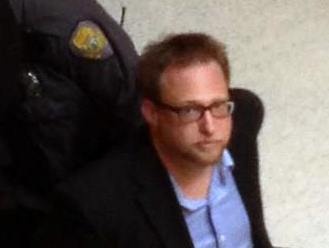Why I joined Moral Monday

I was honored to be among the 151 people who were arrested this week at the N.C. General Assembly while engaging in peaceful civil disobedience at "Moral Monday," the latest in a series of growing demonstrations aimed at what many of us see as an extreme and dangerous turn in the direction of our state.
None of the demonstrators I talked to had made the decision to engage in civil disobedience lightly. Sitting next to me in jail until the early hours of the morning were teachers, a doctor, a farmer, a former state senator and a veteran of Fort Bragg's 82nd Airborne -- people from all walks of life who care deeply about the future of North Carolina and feel like they are running out of options to make their voices heard in the halls of power.
What are the Moral Monday protests, which have brought thousands to Raleigh and resulted in more than 300 arrests, trying to accomplish? For some, it's deeply personal: They are there to register their dissent and bear witness against a fast-moving agenda that targets the poor, jeopardizes the future of schools and attacks the voting rights of tens of thousands of people.
With North Carolina's legislature aggressively pushing to impose costly voter ID restrictions, slash early voting days, and eliminate same-day registration and Sunday voting -- in other words, undermine the conventional channels citizens use to participate in politics and affect change -- is it any surprise that many see a high-profile sit-in as the only way to get lawmakers' attention?
But Moral Monday is clearly about more than that. It's also about signaling to the broader public that the extreme turn in North Carolina won't go unchecked. A recent poll showed that only 25 percent of North Carolinians approve of the job the state legislature is doing.
Yet that hasn't caused lawmakers to slow down. If anything, enjoying super-majorities in the House and Senate seem to have fueled a kind of hubris among lawmakers that ignores any thought of compromise -- and openly aims to sweep away dissent. As Sen. Tommy Tucker infamously told a constituent about a bill being debated in committee in April, “I am the senator, you are the citizen. You need to be quiet.”
Moral Monday has pushed that disconnect into TV newscasts and newspaper headlines. The demonstrations are getting national attention. The public is learning that there are many people just like them who are concerned about pushing pregnant mothers off Medicaid, their schools losing teaching assistants, cuts to the Earned Income Tax Credit for working families while shoveling millions in tax breaks to the wealthy and other measures -- and seeing that it's OK to stand up and speak out.
How are North Carolina's leaders responding to Moral Monday? In some cases, with the same hubris that brought people to protest at the General Assembly in the first place. Rep. John Blust (R) compared them to "crazies" at a basketball game. When asked what buzz he was hearing about the protests among his fellow legislators, Republican Sen. Thom Goolsby sniffed, "There's none."
Gov. Pat McCrory (R), went even further, suggesting that the time-honored practice of nonviolent civil disobedience itself was "unacceptable." As he told WTVD, "We welcome feedback, we welcome lawful demonstrations, however, we don't welcome unlawful demonstrations, and that should not be accepted."
I wonder if McCrory would be willing to say that to the face of Rep. John Lewis or Julian Bond, civil rights veterans who were involved in the founding of the Institute for Southern Studies, where I work today?
They could likely share with McCrory a few lessons from their experience: that small protests often grow to become bigger ones; that peaceful disobedience has been one of the great engines of change in country and world; and that leaders who cavalierly dismiss the concerns of aggrieved people often find themselves on the wrong side of history.
As the Raleigh News & Observer recently concluded in an editorial:
These demonstrations have been building, and signs are that they will continue to do so. The Rev. William Barber, head of the state NAACP, has raised awareness of the GOP’s foolhardy plans and actions, but this movement, and a movement it is, has now gone beyond an individual or one group. As the cross-section of demonstrators proved, this is about all of North Carolina.
Tags
Chris Kromm
Chris Kromm is executive director of the Institute for Southern Studies and publisher of the Institute's online magazine, Facing South.
